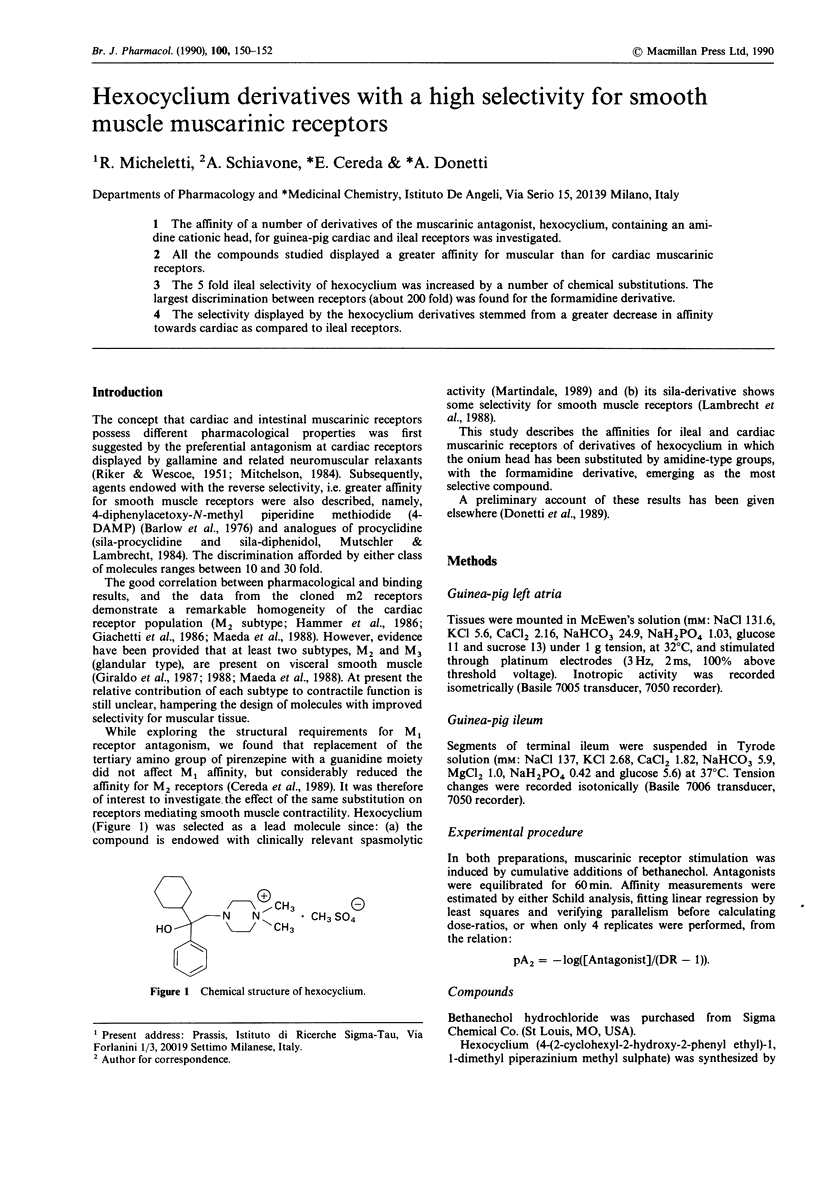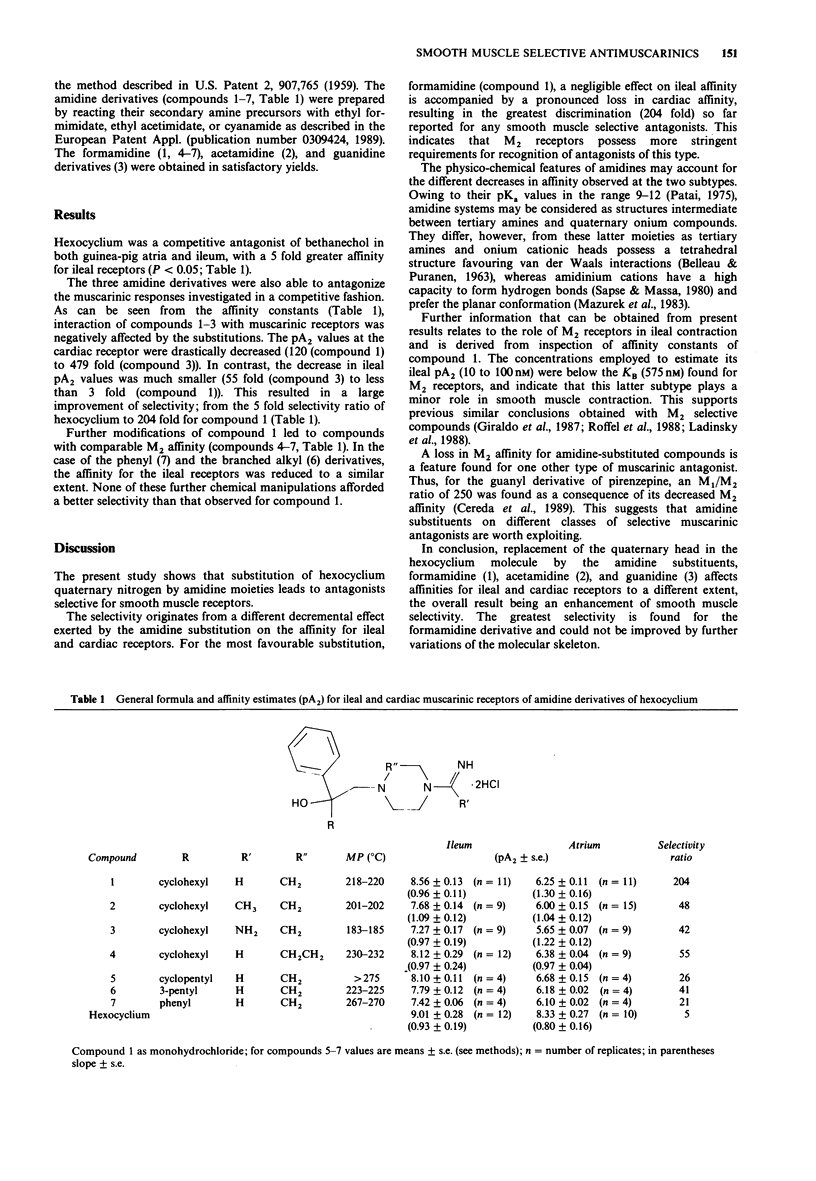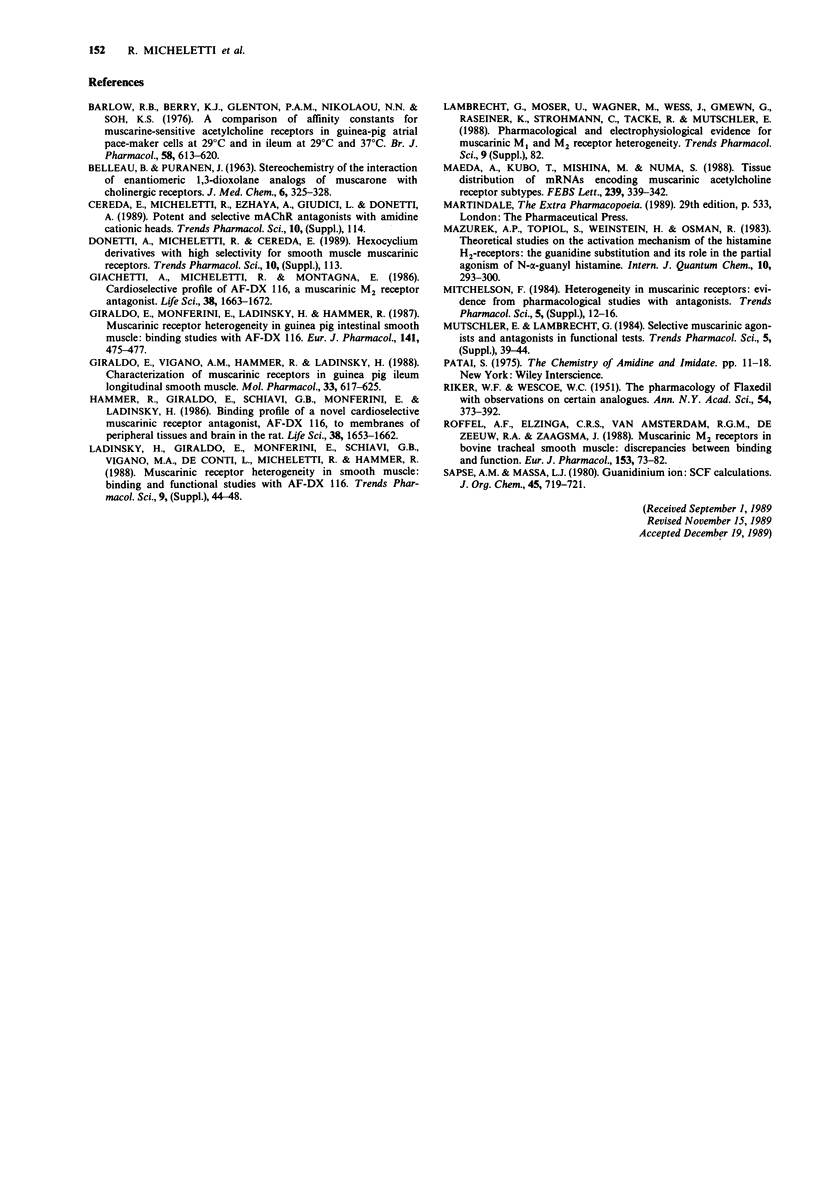Abstract
1. The affinity of a number of derivatives of the muscarinic antagonist, hexocyclium, containing an amidine cationic head, for guinea-pig cardiac and ileal receptors was investigated. 2. All the compounds studied displayed a greater affinity for muscular than for cardiac muscarinic receptors. 3. The 5 fold ileal selectivity of hexocyclium was increased by a number of chemical substitutions. The largest discrimination between receptors (about 200 fold) was found for the formamidine derivative. 4. The selectivity displayed by the hexocyclium derivatives stemmed from a greater decrease in affinity towards cardiac as compared to ileal receptors.
Full text
PDF


Selected References
These references are in PubMed. This may not be the complete list of references from this article.
- BELLEAU B., PURANEN J. STEREOCHEMISTRY OF THE INTERACTION OF ENANTIOMETIC 1,3-DIOXOLANE ANALOGS OF MUSCARONE WITH CHOLINERGIC RECEPTORS. J Med Chem. 1963 May;6:325–328. doi: 10.1021/jm00339a026. [DOI] [PubMed] [Google Scholar]
- Barlow R. B., Berry K. J., Glenton P. A., Nilolaou N. M., Soh K. S. A comparison of affinity constants for muscarine-sensitive acetylcholine receptors in guinea-pig atrial pacemaker cells at 29 degrees C and in ileum at 29 degrees C and 37 degrees C. Br J Pharmacol. 1976 Dec;58(4):613–620. doi: 10.1111/j.1476-5381.1976.tb08631.x. [DOI] [PMC free article] [PubMed] [Google Scholar]
- Giachetti A., Micheletti R., Montagna E. Cardioselective profile of AF-DX 116, a muscarine M2 receptor antagonist. Life Sci. 1986 May 5;38(18):1663–1672. doi: 10.1016/0024-3205(86)90410-8. [DOI] [PubMed] [Google Scholar]
- Giraldo E., Monferini E., Ladinsky H., Hammer R. Muscarinic receptor heterogeneity in guinea pig intestinal smooth muscle: binding studies with AF-DX 116. Eur J Pharmacol. 1987 Sep 23;141(3):475–477. doi: 10.1016/0014-2999(87)90568-1. [DOI] [PubMed] [Google Scholar]
- Giraldo E., Viganò M. A., Hammer R., Ladinsky H. Characterization of muscarinic receptors in guinea pig ileum longitudinal smooth muscle. Mol Pharmacol. 1988 Jun;33(6):617–625. [PubMed] [Google Scholar]
- Hammer R., Giraldo E., Schiavi G. B., Monferini E., Ladinsky H. Binding profile of a novel cardioselective muscarine receptor antagonist, AF-DX 116, to membranes of peripheral tissues and brain in the rat. Life Sci. 1986 May 5;38(18):1653–1662. doi: 10.1016/0024-3205(86)90409-1. [DOI] [PubMed] [Google Scholar]
- Ladinsky H., Giraldo E., Monferini E., Schiavi G. B., Viganò M. A., De Conti L., Micheletti R., Hammer R. Muscarinic receptor heterogeneity in smooth muscle: binding and functional studies with AF-DX 116. Trends Pharmacol Sci. 1988 Feb;Suppl:44–48. [PubMed] [Google Scholar]
- Maeda A., Kubo T., Mishina M., Numa S. Tissue distribution of mRNAs encoding muscarinic acetylcholine receptor subtypes. FEBS Lett. 1988 Nov 7;239(2):339–342. doi: 10.1016/0014-5793(88)80947-5. [DOI] [PubMed] [Google Scholar]
- RIKER W. F., Jr, WESCOE W. C. The pharmacology of Flaxedil, with observations on certain analogs. Ann N Y Acad Sci. 1951 Oct;54(3):373–394. doi: 10.1111/j.1749-6632.1951.tb39932.x. [DOI] [PubMed] [Google Scholar]
- Roffel A. F., Elzinga C. R., Van Amsterdam R. G., De Zeeuw R. A., Zaagsma J. Muscarinic M2 receptors in bovine tracheal smooth muscle: discrepancies between binding and function. Eur J Pharmacol. 1988 Aug 9;153(1):73–82. doi: 10.1016/0014-2999(88)90589-4. [DOI] [PubMed] [Google Scholar]


